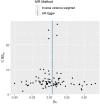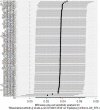Causal relationship between rheumatoid arthritis and epilepsy in a European population: a univariate and multivariate Mendelian randomization study
- PMID: 38817604
- PMCID: PMC11137193
- DOI: 10.3389/fimmu.2024.1389549
Causal relationship between rheumatoid arthritis and epilepsy in a European population: a univariate and multivariate Mendelian randomization study
Abstract
Background: Several previous studies have reported an association between rheumatoid arthritis (RA) and epilepsy, but the causal relationship is unclear. The aim of this study was to assess the connection between RA and epilepsy in a European population using Mendelian randomization (MR).
Methods: Genome-wide association study summary data on RA and epilepsy from European populations were included. Univariate MR (UVMR) and multivariate MR were used to investigate the causal relationship between the two conditions. Three analysis methods were applied: inverse variance weight (IVW), MR-Egger, and weighted median, with IVW being the primary method. Cochran Q statistics, MR-PRESSO, MR-Egger intercept, leave-one-out test, and MR-Steiger test were combined for the sensitivity analysis.
Results: UVMR showed a positive association between RA and epilepsy risk (OR=1.038, 95% CI=1.007-1.038, p=0.017) that was supported by sensitivity analysis. Further MVMR after harmonizing the three covariates of hypertension, alcohol consumption, and smoking, confirmed the causal relationship between RA and epilepsy (OR=1.049, 95% CI=1.011-1.087, p=0.010).
Conclusion: This study demonstrated that RA is associated with an increased risk of epilepsy. It has emphasized that the monitoring of epilepsy risk in patients diagnosed with RA should be strengthened in clinical practice, and further studies are needed in the future to explore the potential mechanism of action connecting the two conditions.
Keywords: Mendelian randomization; autoimmunity; central nervous system; epilepsy; rheumatoid arthritis.
Copyright © 2024 Liu, Ye, He, Ma, Luo, Miao, Li, Cao and Zhu.
Conflict of interest statement
The authors declare that the research was conducted in the absence of any commercial or financial relationships that could be construed as a potential conflict of interest.
Figures





Similar articles
-
Investigating the causal relationship between rheumatoid arthritis and cardiovascular disease: A Mendelian randomization study.Clin Rheumatol. 2025 Mar;44(3):1057-1067. doi: 10.1007/s10067-025-07357-4. Epub 2025 Feb 6. Clin Rheumatol. 2025. PMID: 39909965
-
Causal associations of air pollution with rheumatoid arthritis: A transethnic Mendelian randomization study.PLoS One. 2024 Sep 24;19(9):e0307514. doi: 10.1371/journal.pone.0307514. eCollection 2024. PLoS One. 2024. PMID: 39316602 Free PMC article.
-
Unraveling the causal nexus of cathepsins and rheumatoid arthritis: Insights from a two-sample Mendelian randomization framework.Medicine (Baltimore). 2025 Jun 13;104(24):e42805. doi: 10.1097/MD.0000000000042805. Medicine (Baltimore). 2025. PMID: 40527852 Free PMC article.
-
Association of telomere length with risk of rheumatoid arthritis: a meta-analysis and Mendelian randomization.Rheumatology (Oxford). 2020 May 1;59(5):940-947. doi: 10.1093/rheumatology/kez524. Rheumatology (Oxford). 2020. PMID: 31697380
-
Analysis of the causal relationship between immune cells and rheumatoid arthritis from the perspective of genetic variation: a bidirectional two-sample Mendelian randomization study.Adv Rheumatol. 2024 Nov 1;64(1):83. doi: 10.1186/s42358-024-00425-4. Adv Rheumatol. 2024. PMID: 39487558 Review.
Cited by
-
Identifying the genetic association between rheumatoid arthritis and the risk of infectious diseases.Clin Rheumatol. 2025 Jul;44(7):2611-2619. doi: 10.1007/s10067-025-07485-x. Epub 2025 May 16. Clin Rheumatol. 2025. PMID: 40377766
-
Causal relationships between metabolic syndrome, plasma metabolites, and female reproductive diseases: insights from a two-step mendelian randomization approach.Nutr Metab (Lond). 2025 Jun 13;22(1):60. doi: 10.1186/s12986-025-00955-8. Nutr Metab (Lond). 2025. PMID: 40514674 Free PMC article.

